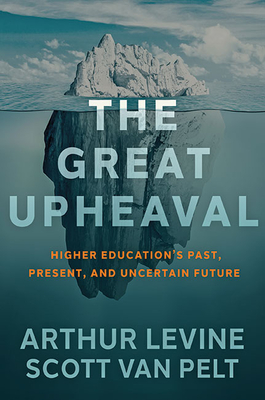The Great Upheaval: Higher Education's Past, Present, and Uncertain Future by Arthur Levine and Scott Van Pelt
In The Great Upheaval, Arthur Levine and Scott Van Pelt examine higher and postsecondary education to see how it has changed to become what it is today--and how it might be refitted for an uncertain future. Taking a unique historical, cross-industry perspective, Levine and Van Pelt perform a 360-degree survey of American higher education. Combining historical, trend, and comparative analysis of other business sectors, they ask
- how much will colleges and universities change, what will change, and how will these changes occur?
- will institutions of higher learning be able to adapt to the challenges they face, or will they be disrupted by them?
- will the industrial model of higher education be repaired or replaced?
- why is higher education more important than ever?
The book is neither an attempt to advocate for a particular future direction nor a warning about that future. Rather, it looks objectively at the contexts in which higher education has operated--and will continue to operate. It also seeks to identify likely developments that will aid those involved in steering higher education forward, as well as the many millions of Americans who have a stake in its future.
Concluding with a detailed agenda for action, The Great Upheaval is aimed at policy makers, college administrators, faculty, trustees, and students, as well as general readers and people who work for nonprofits facing the same big changes.
Review: Published in 2021, this book attempts to review the future of higher education and project future changes colleges and universities are facing in the coming years, as accelerated by the COVID-19 pandemic. It presents an overview of higher education's history in the United States, a review of where it stands currently, and some thoughts on where it could go and what strategies might meet with the most success to keep higher education relevant in the coming decades.
I want to preface my review by saying I read this at the behest of my employer and am approaching it as somehow who participated in traditional liberal arts education and as someone who works in higher education at the community college level. I do think the authors raise several valid points and hopefully inspire readers who may be in positions to effect change to think about how they should proceed with their work. In particular, their thoughts on being responsive to students' demands regarding higher education, including convenience, service, a quality product, and low cost (135). Additionally, the book's urging that higher education must increasingly move away from the idea of completion being based on time or credits must be heeded.
However, in other ways, this book felt like a lot of fear mongering. Higher education in America has existed for four hundred years. I believe the need for it is even in more demand given the technical nature of most jobs in today's world. In addition, while change can be slow to arrive, higher education has proven its ability to change and grow over time. Sure, some colleges and universities will fall by the wayside, but certainly many will carry on. Also, they seem to contradict themselves at times. For instance, the introduction insists that this is a forward-facing book and they're not going to waste time dwelling on higher education's history and then proceed to provide a rather inept, very broad strokes ninety-page history.
Stars: 3



Comments
Post a Comment